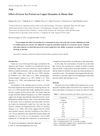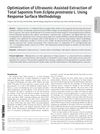 6 citations,
October 2016 in “Food Science and Biotechnology”
6 citations,
October 2016 in “Food Science and Biotechnology” The water extract of Bituminaria bituminosa, high in phenolic compounds, shows strong antioxidant and enzyme inhibitory potential.
 6 citations,
September 2014 in “Food Additives & Contaminants: Part A”
6 citations,
September 2014 in “Food Additives & Contaminants: Part A” New method effectively detects illegal hormones in anti-aging foods.
 2 citations,
November 2017 in “Food Additives & Contaminants: Part A”
2 citations,
November 2017 in “Food Additives & Contaminants: Part A” The new method accurately detects illegal hair-growth drugs in dietary supplements.
 January 2013 in “Food science and technology research”
January 2013 in “Food science and technology research” Green tea extract may increase copper levels in mouse hair without affecting liver copper.
 44 citations,
August 2012 in “Journal of Food Science”
44 citations,
August 2012 in “Journal of Food Science” The best way to extract saponins from Eclipta prostrasta is using 70% ethanol, at 70°C for 3 hours with a 14:1 liquid to solid ratio.
 13 citations,
September 2012 in “Critical Reviews in Food Science and Nutrition”
13 citations,
September 2012 in “Critical Reviews in Food Science and Nutrition” Wheat straw is valuable for its health benefits and various industrial uses.
 11 citations,
April 2013 in “Journal of Agricultural and Food Chemistry”
11 citations,
April 2013 in “Journal of Agricultural and Food Chemistry” Monascus helps prevent baldness, prostate issues, and may be a natural alternative to medications.
 7 citations,
June 2021 in “Trends in Food Science and Technology”
7 citations,
June 2021 in “Trends in Food Science and Technology” Western diet may cause male pattern baldness; low glycemic diet with magnesium could help.
 January 2018 in “International journal of food and nutrition research”
January 2018 in “International journal of food and nutrition research” Intermittent iron and nutritional supplements can help reduce hair loss.
 2 citations,
June 2023 in “Food science & nutrition”
2 citations,
June 2023 in “Food science & nutrition” Eating apples can help prevent heart disease, cancer, and other conditions because they have healthy plant chemicals.
 May 2024 in “Food bioscience”
May 2024 in “Food bioscience” Wood sterol may help reduce hair loss caused by a high-fat diet.
 3 citations,
September 2021 in “Journal of Food Science and Nutrition”
3 citations,
September 2021 in “Journal of Food Science and Nutrition” Red Ginseng Extract helps hair grow and improves skin health by stimulating cell growth and enhancing the body's antioxidant defense system.
 3 citations,
May 2018 in “Journal of nutritional health & food science”
3 citations,
May 2018 in “Journal of nutritional health & food science” Nutritional supplements can help manage hair loss and promote hair growth by strengthening hair roots and countering harmful effects of pollution, smoking, and deficiencies in vitamins and minerals.
 59 citations,
August 2014 in “International Journal of Biological Macromolecules”
59 citations,
August 2014 in “International Journal of Biological Macromolecules” The study found an efficient method to extract antioxidants from Hibiscus leaves.
 26 citations,
March 2014 in “Journal of cutaneous medicine and surgery”
26 citations,
March 2014 in “Journal of cutaneous medicine and surgery” Topical vitamin D is useful for some skin conditions but not effective for others, and more research is needed.
 4 citations,
December 2009 in “Elsevier eBooks”
4 citations,
December 2009 in “Elsevier eBooks” Breadfruit is nutritious and has potential health and medicinal benefits, but is currently underused.
 3 citations,
April 2021 in “Journal of Cosmetic Dermatology”
3 citations,
April 2021 in “Journal of Cosmetic Dermatology” Combination therapy with QR 678 Neo and 5% Minoxidil is most effective for male hair loss.
 May 2023 in “International Journal of Home Science”
May 2023 in “International Journal of Home Science” PCOS is linked to metabolic issues and infertility, needing more research.
 October 2018 in “International journal of clinical & experimental dermatology”
October 2018 in “International journal of clinical & experimental dermatology” Baicapil was effective in reducing hair loss and increasing hair growth in women with telogen effluvium.
 July 2011 in “Springer eBooks”
July 2011 in “Springer eBooks” The document concluded that FDA-approved treatments like minoxidil and finasteride are effective for hair loss, while the effectiveness of natural remedies and other non-approved treatments is not well-supported by evidence.
 January 2017 in “Cogent Medicine”
January 2017 in “Cogent Medicine” Extracts improve hair growth in alopecia.
 178 citations,
April 2017 in “Journal of The American Academy of Dermatology”
178 citations,
April 2017 in “Journal of The American Academy of Dermatology” Minoxidil, finasteride, and low-level laser light therapy effectively treat hair loss.
 89 citations,
November 2014 in “International Journal of Nanomedicine”
89 citations,
November 2014 in “International Journal of Nanomedicine” Using nanostructured lipid carriers to deliver spironolactone could improve treatment for hair loss.
 86 citations,
January 2008 in “Journal of nutritional & environmental medicine”
86 citations,
January 2008 in “Journal of nutritional & environmental medicine” Green tea may help with health issues like cancer, heart disease, and weight loss due to its high catechin content.
 81 citations,
March 2009 in “Seminars in Cutaneous Medicine and Surgery”
81 citations,
March 2009 in “Seminars in Cutaneous Medicine and Surgery” Effective hair loss treatment in women requires correct diagnosis and can include medications like minoxidil, antiandrogens, and treatments for underlying conditions like PCOS.
 77 citations,
January 2015 in “International Journal of Biological Macromolecules”
77 citations,
January 2015 in “International Journal of Biological Macromolecules” Chitosan nanoparticles improve minoxidil delivery to hair follicles for better alopecia treatment.
 68 citations,
November 2015 in “The Journal of Allergy and Clinical Immunology”
68 citations,
November 2015 in “The Journal of Allergy and Clinical Immunology” Blocking IL-12/IL-23p40 helped reverse severe hair loss in patients.
 46 citations,
September 2010 in “Southern Medical Journal”
46 citations,
September 2010 in “Southern Medical Journal” Hair loss treatments include medications and new methods like low-level light therapy, which may work by boosting cell activity and blood flow.
 42 citations,
January 2007 in “Pediatric dermatology”
42 citations,
January 2007 in “Pediatric dermatology” Low-potency steroids can cause serious side effects in people with skin conditions like Netherton syndrome.
 36 citations,
February 2017 in “BMC Complementary and Alternative Medicine”
36 citations,
February 2017 in “BMC Complementary and Alternative Medicine” Geranium sibiricum extract helps hair grow and is more effective than minoxidil but can be toxic in high concentrations.






























